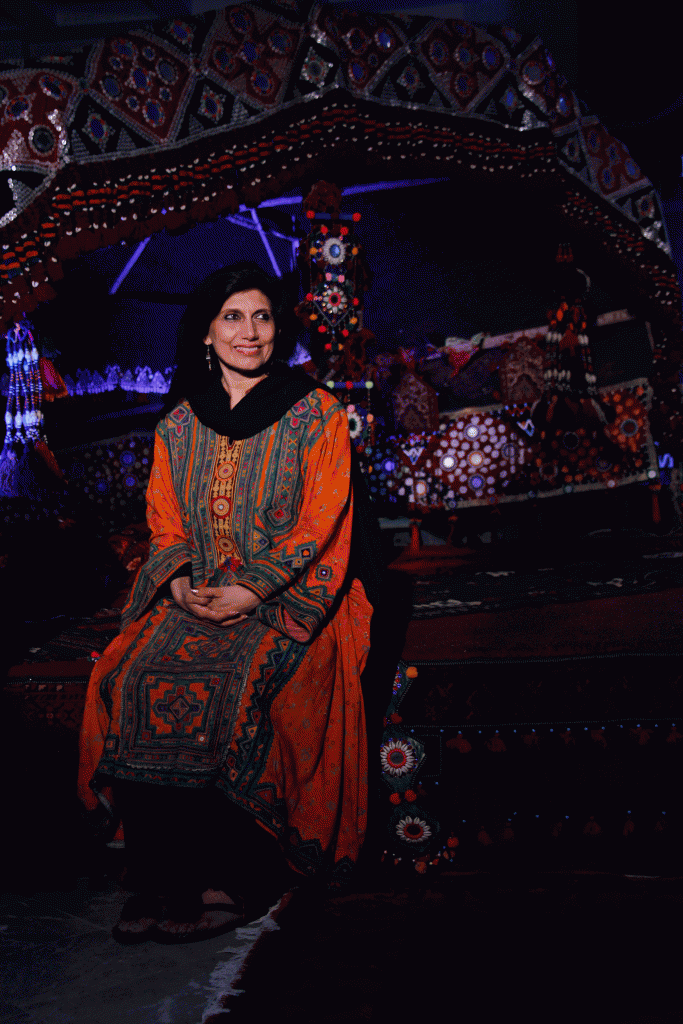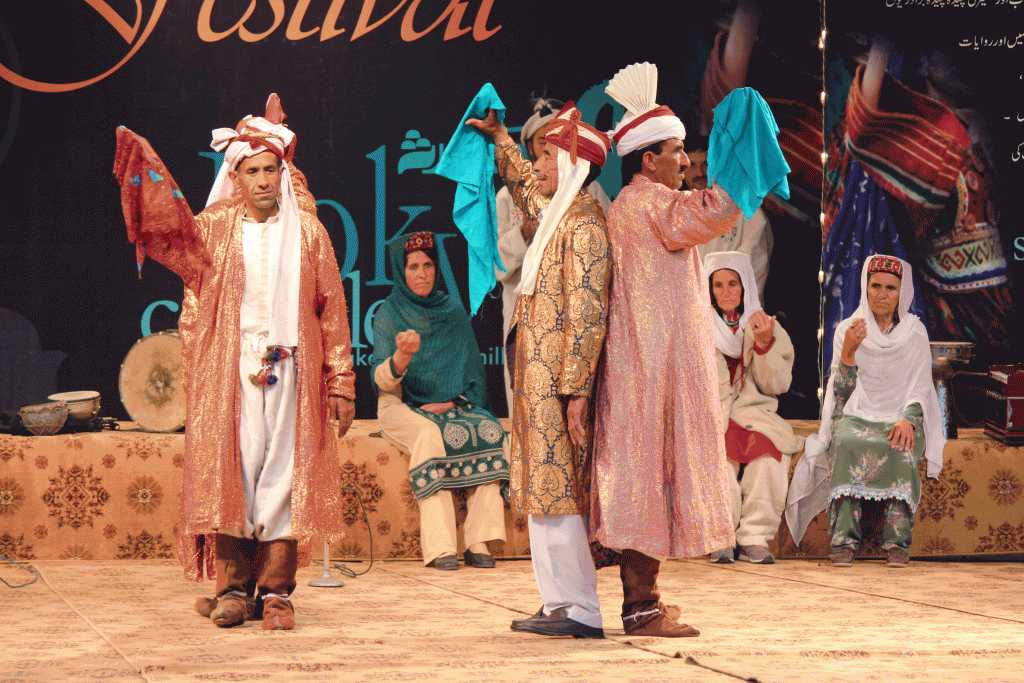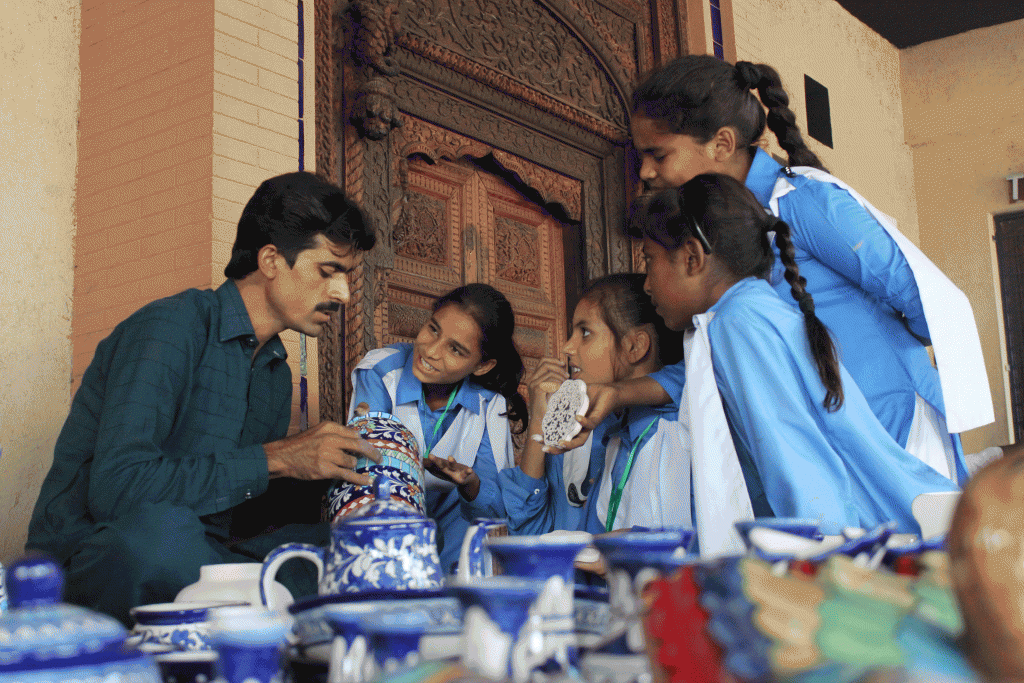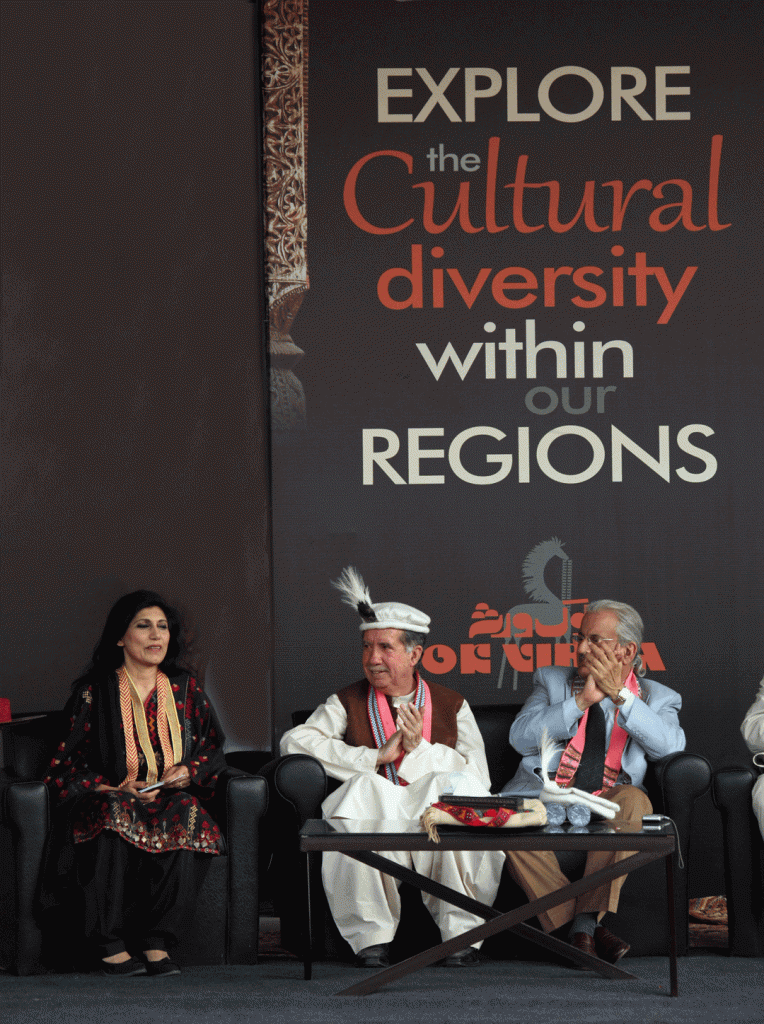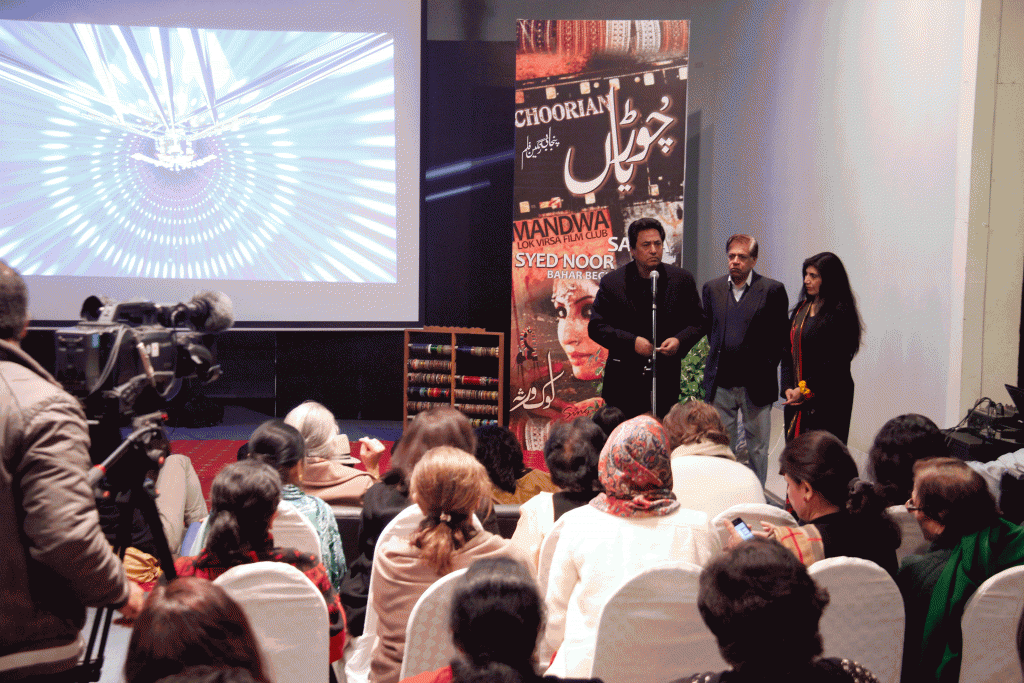Profile: Dr Fouzia Saeed, Executive Director Lok Virsa
By Amna R. Ali | Interview | Profile | Published 8 years ago
“The Lok Virsa is labelled as one of the breakthroughs in the gloom, some good news from Pakistan,” says Dr Fouzia Saeed, speaking of what she calls the organisation’s recent revival where she has been executive director for over a year now. She took some time out for this interview despite the constant knocks on her office door.
“I’ve steered Lok Virsa’s strategy towards objectives that are angled very differently. Previously the focus was on documentation, preservation, collection and some programming, following the Virsa’s mandate to preserve, document and promote cultural heritage,” says Dr Saeed, explaining her own programming-rich approach. “The most important focus is our cultural identity — we are South Asian people and have to connect with history much before 1947 and Muhammad bin Qasim. We must own all the cultural layers, religions, ethnicities and all kinds of communities with pride,” she says emphatically. “Shanakht is strength.”
The Islamabad-based Lok Virsa was the folk culture offshoot of the first Pakistan National Council of the Arts (PNCA) established in 1972, of which Faiz Ahmed Faiz was the first chairman. Another offshoot under Faiz’s PNCA patronage was the Pakistan Academy of Letters, with Ahmed Faraz as its first chairman. Lok Virsa began as the Folklore Research Centre to document oral literature, as envisioned by Uxi Mufti, then producer of PTV’s Lok Tamasha, which had documented the relatively unknown folk music of Pakistan. Later, the centre’s mandate was extended beyond research to include non-verbal folklore and emerged to become the Lok Virsa of today.
The present Lok Virsa comprises the Heritage Museum, also known as the Ethnology Museum of Pakistan, which presents the history and the living traditions of the people of the country. It houses the Virsa Media Centre, Research Centre, Publishing House, Heritage Library, the Video and Sound Archive, and the Monument Museum in Shakarparian. Lok Virsa is one of the largest publishers of traditional music — folk, classical and instrumental — and has a huge collection of audio and video material. Unfortunately, a substantive amount of the archives and recordings were smuggled out of the country and sold abroad in recent years, but to date no measures have been taken to investigate the issue.
Dr Fouzia Saeed came to the Lok Virsa at a time when the standards at Pakistan’s only folk heritage repository had been deteriorating for a decade or so. “In 2004, everything was outsourced by my predecessors, Uxi Mufti and Mazhar-ul-Islam, and I inherited a staff of over a hundred who were not doing very much!” The Lok Virsa outsourced the archives, heritage museum, open-air theatre, production house, the annual Lok Mela, and other cultural events, including sale of entry tickets and cafeteria operations, to one company, in an agreement which was in violation of rules and was passed without approval from Lok Virsa’s board of governors. The renewal of the contracts also did not fulfil the rules and formalities of procedure.
Dr Saeed was emphatic about the two or three significant changes she was planning to make. “I told my staff, you talk about your institution — well, it’s not really ours, it belongs to the awaam, we are keeping it for them and are here for them.” Her emphasis on serving the public is a consistent refrain. “In these past few years, the Virsa had become like the chota of the ruling elite to provide entertainment and colour to government functions.” This positive turnaround to serve the people is clearly Dr Saeed’s mantra and she prides herself on getting a lot of people on board, including the current Federal Minister for Information, Broadcasting and National Heritage, Senator Pervaiz Rasheed. Recently, the Prime Minister asked Senator Rasheed and Attaullah Qasmi to draft a culture policy and the Lok Virsa was asked to take the lead in developing the draft, consulting experts in all the provinces, especially Sindh and Balochistan. “Culture has been devolved and very few platforms have been left under the national umbrella” she says. “And since Lok Virsa is a national institute, we have to be very just in the way we promote culture, since we are a combination of so many cultures. Gilgit Baltistan (GB) and Balochistan were high on the priority list for the first year and for the first time the GB government officially took part in the annual Lok Mela last year. Similarly, the Sindhi community — there is a large number in the twin cities — and the Hazara community, were also brought on board to participate in cultural events. “On Nauroze we held a special festival which resulted in a lot of healing for the Hazara community, who were in tears and so moved because we accepted them as a cultural entity. It was heartening to see that the audience was in perfect tune with the Farsi singers, proving that the Persian rubaiya is also our culture, not just the Punjabi chimta. In the same way, the rich culture of the Northern Areas is immensely valuable, as is the Marwari, Khwaar, Wakhi, Seraiki, Shina among the variety of sub-cultures and languages in every province.”
Promoting the slogan ‘Diversity Within’ is high on Dr Saeed’s to-do list. She organised the ‘Mother Languages Literature Festival,’ with two other partners, featuring 25 regional languages. In April this year, the Islamabad Literature Festival (ILF), organised annually by the Oxford University Press, was held for the first time at the Lok Virsa, showcasing an extensive programme highlighting literary and cultural diversity.
“The new generations are slipping away and losing their cultural identity; their perception of culture is so narrow and monolithic and we need to address that. There must be something wrong with our institutions,” says Dr Saeed, explaining that the primary target for Virsa programming are children and youth and several interventions with specific programmes have been made in schools. “In the earlier days we were purists, but now we need to relearn the best way to connect with the younger generation,” she says, outlining new strategies such as social media and online interaction.
Saeed has extended the definition of folklore to also encompass cultural behaviour from recent times: “Folklore is not necessarily ancient: and it’s not just about a cow grazing in the fields and a flute player…” She also finds that the constituency of culture has never been organised, and to cover that gap has introduced some new initiatives such as the creation of ‘Autaq,’ an umbrella for a network of small tanzeems/ organisations to foster good relations with the cultural department of provinces and work with organisations that link directly with the populace. Interestingly, she has also begun to promote what she categorises as folklore from recent times. “I like putting small groups together, pagal, pagal sey, she says, like the ‘Mandwa’ film club which aims to recreate the environment of cinemas of a couple of decades back to show that folklore doesn’t have to be rural, nor does it have to be the antithesis of modernisation. Mandwa has shown some iconic films over the past year and Saeed has gathered a like-minded group of people, such as acclaimed director Aijaz Gul, who decide collectively what they will screen. It could be Aina — an iconic Pakistani film that was released in March 1977, or even Mastana Mahi and Heer Ranjha. “Community engagement is an important priority to inculcate ownership of projects. Therefore, inducting volunteers was key, especially experienced ones, for example, the core group of the Mandwa film club are volunteers,” she says.
Programming-wise, Saeed is working on themes such as ‘Women Reclaim Culture’ built on a discourse on ‘Indigenous Feminism’ with the aim of making women conscious of the spaces and activities which are gradually being taken away or are becoming male-dominated. She has organised activities like the ‘dholak geet contest’ to promote women’s creative expression via the dholak, an instrument that has largely been in the female domain, and is especially used at weddings. The event provides a legitimate space for females to learn, bond and share information and wisdom. Saeed bemoans the fact that women are pushed into the background in a lot of cultural activity in Pakistan, whether it be folk dance or folk music; she hopes to bring women from across provinces and remote areas like Thar and the north of Pakistan to the forefront.
Public response to recent changes has been positive and they have come to the Virsa in throngs. Non-flash photography is allowed in all public areas of the Virsa in order to rev up social media-sharing on all platforms; live streaming of events like the annual Lok Mela is available on the Virsa website; the ‘Craft of the Month’ training programme with master artisans in pottery, lacquer, natural dyes etc. has been introduced to acquaint children and adults with this region’s civilisational past and crafts. There is a constant hunt for new artists and new groups have been formed, including a children’s ensemble comprising 15 boys and girls that the Lok Virsa hopes to take abroad for cultural programmes. Links with local museums and international forums is another priority and the Lok Virsa has partnered with the Lahore Museum recently and aims to garner the support of the Library of Congress and the Smithsonian to help with the archives, among other things.
When it comes to institutional challenges, Dr Saeed inherited quite the behemoth when her three-year tenure began just over a year ago, and her aim is to make the governance structure institutionally strong. Several steps were taken; the Lok Virsa reconstituted its board, since there had been none for nearly two-and-a half years before her arrival. She wrote a new set of rules which is pending approval from the ministries — this had to be done because even though the organisation was reconstituted in 2002 through an act of parliament in the Musharraf era, no rules were written. No appointments have been made for the past 26 years (since 1990) — and cannot be made till the rules are approved. Dealing with an embedded bureaucracy has been quite a challenge. Many officials gave themselves an 800 per cent raise in pension, which has now been declared an unauthorised decision by the Lok Virsa board. Officials also took loans and treated them as grants; a host of petty corruption issues plagued the organisation, and a lackadaisical set-up didn’t help matters either. Interestingly, accounts are still being maintained in pencil in registers. “Mine is a clean-up mission,” says Dr Saeed. “I’m trying to rejuvenate and diffuse corrupt elements.” Despite facing personal attacks in the media from disgruntled elements, she plans to continue her mission to bring the Virsa up to a certain standard and build a good team in the remaining two years of her tenure.
“How will folk culture get more space?” we ask Dr Saeed in conclusion. She is of the view that culture needs to be pruned all the time and choices must be made, in the same way as you eliminate poisonous weeds when you grow wheat. Her strategy is to couch traditional culture in a manner as to make it palatable for the younger generation. “I cannot stick to my purist ethics and compete with cultural consumerism. I have to make folk culture attractive and not undermine it, to create a vast outreach.” Her decisions so far have been at par with her progressive outlook. “My focus is to change the environment, revive each section and bring it back to life. We have to develop ownership, and institutions such as this one should become the priority of the people.”
The writer is a former assistant editor at Newsline



